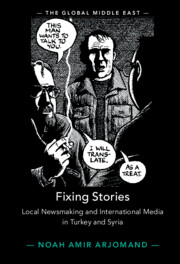Book contents
- Fixing Stories
- Reviews
- The Global Middle East
- Fixing Stories
- Copyright page
- Dedication
- Contents
- Figures & Tables
- Acknowledgments
- Introduction: A Tale of Two Fixers
- Part I Beginnings
- Part II Fitting In
- Part III Moral Worlds of Ambivalence and Bias
- A Fragmented World
- Noah
- Burcu
- Elif
- Nur
- Elif
- José and Zeynep
- Nur
- Aziz
- Karim
- Habib
- Unifying Worlds
- Part IV Translations
- Part V From Local to Global
- Appendix: Sociological Fiction
- Bibliography
- Index
A Fragmented World
from Part III - Moral Worlds of Ambivalence and Bias
Published online by Cambridge University Press: 18 March 2022
- Fixing Stories
- Reviews
- The Global Middle East
- Fixing Stories
- Copyright page
- Dedication
- Contents
- Figures & Tables
- Acknowledgments
- Introduction: A Tale of Two Fixers
- Part I Beginnings
- Part II Fitting In
- Part III Moral Worlds of Ambivalence and Bias
- A Fragmented World
- Noah
- Burcu
- Elif
- Nur
- Elif
- José and Zeynep
- Nur
- Aziz
- Karim
- Habib
- Unifying Worlds
- Part IV Translations
- Part V From Local to Global
- Appendix: Sociological Fiction
- Bibliography
- Index
Summary
The term ambivalence is only a century old. Swiss psychiatrist Eugen Bleuler coined the word at a time when social scientists were grappling with the rapid societal change of modernization. In the new metropolis, millions of people could move among disparate social worlds and take on multiple roles with far greater ease and speed than in the village (Simmel [1903] 1971; Bauman 1991: 60–63; Bernet 2006). Some feared that society’s moral order would come crashing down because people were faced with a splintering of culture and morality as they moved from work to home to recreational life. They could no longer abide by a simple, unified moral world. Taking on a multitude of roles and being exposed to a multitude of different expectations could – social scientists, theologians, and cultural commentators worried – free people to do whatever they wanted with no unified moral code to regulate their actions, or render people ambivalent to the point of moral paralysis or psychological breakdown.
- Type
- Chapter
- Information
- Fixing StoriesLocal Newsmaking and International Media in Turkey and Syria, pp. 105 - 108Publisher: Cambridge University PressPrint publication year: 2022



